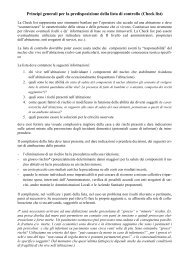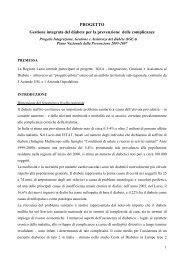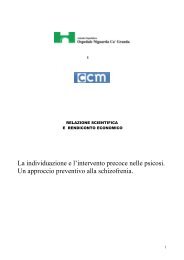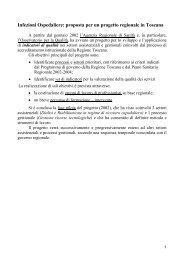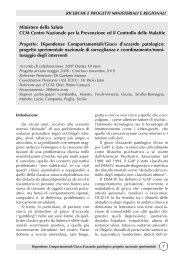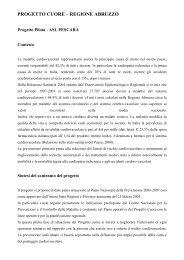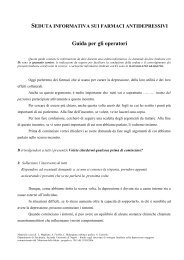Gaining health : analysis of policy development in European ...
Gaining health : analysis of policy development in European ...
Gaining health : analysis of policy development in European ...
Create successful ePaper yourself
Turn your PDF publications into a flip-book with our unique Google optimized e-Paper software.
Chapter 5<br />
224<br />
surveys over long periods <strong>of</strong> time and <strong>of</strong>fer<strong>in</strong>g comparable<br />
<strong>in</strong>ternational data and tra<strong>in</strong><strong>in</strong>g or nurtur<strong>in</strong>g national teams<br />
<strong>of</strong> experts. In Hungary, most <strong>of</strong> the outstand<strong>in</strong>g prime movers<br />
beh<strong>in</strong>d the <strong>policy</strong> documents <strong>in</strong> the 1980s and 1990s<br />
had previously been directly <strong>in</strong>volved <strong>in</strong> the MONICA<br />
Project.<br />
In countries with a long history <strong>of</strong> NCD <strong>policy</strong> <strong>development</strong>,<br />
work carried out <strong>in</strong> relation to monitor<strong>in</strong>g and<br />
revis<strong>in</strong>g previous policies provided a significant source <strong>of</strong><br />
<strong>in</strong>formation for new <strong>policy</strong> formulation, sav<strong>in</strong>g time and energy.<br />
In F<strong>in</strong>land, Ireland and Lithuania <strong>in</strong> particular, extensive<br />
evaluations <strong>of</strong> previous <strong>policy</strong> implementation add to the<br />
rich source <strong>of</strong> <strong>in</strong>formation utilized, and are probably conducive<br />
to identify<strong>in</strong>g potential difficulties <strong>in</strong> <strong>policy</strong> implementation.<br />
Reflect<strong>in</strong>g <strong>in</strong>equalities <strong>in</strong> <strong>health</strong><br />
The availability and use <strong>of</strong> data on socioeconomic differences<br />
<strong>in</strong> mortality, morbidity and lifestyles are well-developed<br />
<strong>in</strong> some case-study countries and sporadic or completely<br />
miss<strong>in</strong>g <strong>in</strong> others. In F<strong>in</strong>land, Ireland and Lithuania, epidemiological<br />
data on mortality and morbidity reflect<strong>in</strong>g <strong>in</strong>equalities<br />
<strong>in</strong> <strong>health</strong> are available to a reasonable extent, not only<br />
at national but also at regional and local levels. In these<br />
countries, such <strong>in</strong>formation is published <strong>in</strong> regular reports<br />
and can be readily utilized <strong>in</strong> formulat<strong>in</strong>g <strong>health</strong> <strong>policy</strong>. Such<br />
reports can also give decision-makers a better understand<strong>in</strong>g<br />
<strong>of</strong> the need for <strong>in</strong>tersectoral action and for shift<strong>in</strong>g the<br />
focus <strong>of</strong> attention to tackl<strong>in</strong>g the determ<strong>in</strong>ants <strong>of</strong> <strong>health</strong>.<br />
High-quality research, if easily available, may be picked up<br />
when the time is ripe, such as <strong>in</strong> England where the famous<br />
Black Report (4) on <strong>in</strong>equalities <strong>in</strong> <strong>health</strong> was first published<br />
<strong>in</strong> 1980. Although frostily received by the government <strong>of</strong><br />
the day, this and similar reports proved to be a valuable and<br />
ready-made resource to be utilized when the political mood<br />
<strong>of</strong>fered a w<strong>in</strong>dow <strong>of</strong> opportunity. The Netherlands carried<br />
out extensive research programmes <strong>in</strong>volv<strong>in</strong>g research<br />
<strong>in</strong>stitutions across the country for over a decade, first to<br />
expla<strong>in</strong> <strong>in</strong>equalities <strong>in</strong> <strong>health</strong> and second to generate more<br />
knowledge on the effectiveness <strong>of</strong> <strong>in</strong>terventions and policies<br />
to reduce socioeconomic <strong>in</strong>equalities <strong>in</strong> <strong>health</strong> (5).<br />
The “mapp<strong>in</strong>g” <strong>of</strong> <strong>in</strong>equalities has also proved to be a powerful<br />
tool at the local level, such as <strong>in</strong> F<strong>in</strong>land and Lithuania<br />
where it raises awareness among politicians, who compare<br />
“their” region to their neighbours’. A number <strong>of</strong> other<br />
countries outside the study group <strong>of</strong>fer excellent examples<br />
<strong>of</strong> the effective use <strong>of</strong> mapp<strong>in</strong>g for <strong>policy</strong> <strong>development</strong>.<br />
Pioneers such as the City <strong>of</strong> Rotterdam, for example, have<br />
developed <strong>in</strong>dicators and s<strong>of</strong>tware programs not only to<br />
signal public <strong>health</strong> problems but to try to identify determ<strong>in</strong>ants<br />
and <strong>of</strong>fer solutions on a <strong>policy</strong> level (6).<br />
Socioeconomic determ<strong>in</strong>ants <strong>of</strong> <strong>health</strong><br />
Information on the socioeconomic determ<strong>in</strong>ants <strong>of</strong> <strong>health</strong><br />
are much less prevalent <strong>in</strong> the <strong>policy</strong> formulation process,<br />
except <strong>in</strong> those few countries where equality <strong>in</strong> <strong>health</strong> is<br />
more than a rhetorical factor <strong>in</strong> <strong>policy</strong> formulation. The<br />
Swedish public <strong>health</strong> <strong>policy</strong> is a notable exception.<br />
Ow<strong>in</strong>g to the activities <strong>of</strong> the WHO Commission on Social<br />
Determ<strong>in</strong>ants <strong>of</strong> Health, important progress has been made<br />
<strong>in</strong> strengthen<strong>in</strong>g the scientific knowledge base for <strong>policy</strong> <strong>development</strong>.<br />
This conceptual framework was not available for<br />
the NCD <strong>policy</strong> plann<strong>in</strong>g processes exam<strong>in</strong>ed here, but may<br />
strongly <strong>in</strong>fluence <strong>health</strong> <strong>policy</strong> <strong>development</strong> <strong>in</strong> the future.<br />
Availability <strong>of</strong> <strong>health</strong> care for NCD<br />
Perhaps surpris<strong>in</strong>gly, <strong>in</strong>formation on the availability, accessibility<br />
and effectiveness <strong>of</strong> <strong>health</strong> care for NCD does not<br />
appear to be generally available. Studies led by the EU have<br />
uncovered considerable and unacceptable <strong>in</strong>equalities <strong>in</strong> this<br />
area. An attempt <strong>in</strong> Ireland to explore this situation recently<br />
led to the <strong>development</strong> <strong>of</strong> a framework for manag<strong>in</strong>g care<br />
for chronic diseases.<br />
Reflections on experiences



